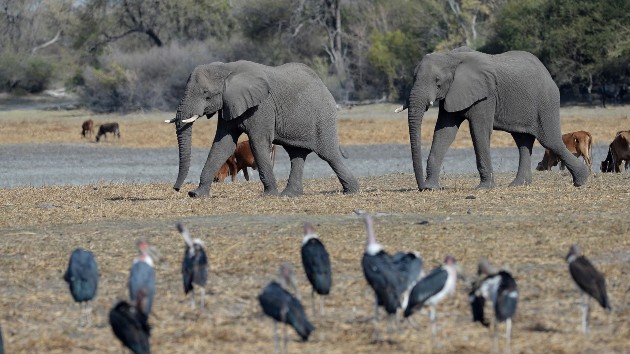(LONDON) — Botswana’s President Mokgweetsi Masisi has offered to export 20,000 elephants to Germany in a conservation spat with Berlin following comments from Germany’s environment ministry calling on tougher rules on the import of hunting trophies.
“20,000 wild elephants for Germany. It’s not a joke,” Masisi said speaking to German newspaper Bild. “It is very easy to sit in Berlin and have an opinion about our affairs in Botswana. We are paying the price for preserving these animals for the world.”
Maisisi was responding to comments from German Environment Minister and Green Party politician, Steffi Lemke, calling on the southern African nation to restrict the movement of hunting trophies due to poaching concerns.
Germany — one of the European Union’s largest importers of hunting trophies — proposed introducing stricter limits on the imports of hunting trophies, citing concerns over poaching.
The move was met with scorn from Botswana, with Maisisi saying Germans should try living “together with the animals, in the way you are trying to tell us to.” The president said Botswana does more “than any country in the world” in wildlife protection.
Botswana is home “one of the last strongholds for African elephants,” with over 130,000 elephants living within the borders of the southern African nation, according to the African Wildlife Foundation.
Botswana is home to the largest elephant population in the African continent, and the world.
However, Botswana has said it is tackling an “overpopulation” of elephants — particularly in the north of the nation — with high population of the giants causing an increase in human-wildlife conflict, inflicting damage on vegetation and in some cases trampling residents.
Trophy hunting — which refers to the hunting of animals for sport for “trophies” such as horns, tusks, heads and antlers — has been a divisive topic in Africa, with conservationists arguing that the activity is exacerbating the decline of wildlife populations that are already facing the threat of decline due to poaching. However Botswana, and other conservationists, argue the activity can help revive animal populations, helping to fund communities, deter poachers and protect biodiversity.
In 2014, Botswana instituted a ban on trophy hunting following a decline in local elephant populations. However, the ban was reinstated in 2019 following pressure from local communities, with the southern African nation now issuing hunting quotas for elephants and other species.
Maisisi said restricting the import of trophies will harm conservation efforts by causing a spike in poaching, leading to loss of wildlife habitats and decrease income for Botswana, leading to poverty.
Last month, Botswana’s Environment and Tourism minister, Dumezweni Mthimkhulu, said trophy hunting was a mechanism of “controlling elephants” as opposed to culling them, providing a source of income for Botswana.
In an interview with Sky News, Mthimkhulu suggested sending 10,000 elephants to London’s Hyde Park, so the British could have a “taste of living alongside them,” following the introduction of the Hunting Trophies (Import Prohibition) Bill.
Following the conservation spat, Botswana’s Ministry of Environment announced Mthimkhulu has urged his German counterpart to consider an “in-depth consultation and assessment” on the impact of the proposed ban on importation of Hunting trophies with European Union Members, urging them to visit Botswana to “appreciate the country’s conservation strides.”
“Minister Mthimkhulu reiterated that hunting is a significant wildlife conservation measure widely used in Southern Africa and other parts of East Africa, that generates income and used to combat poaching, support community development, habitat Protection and adapting to the effects of climate change,” the ministry said.
ABC News has reached out to Botswana’s Ministry of Environment and Tourism for comment.
Copyright © 2024, ABC Audio. All rights reserved.












